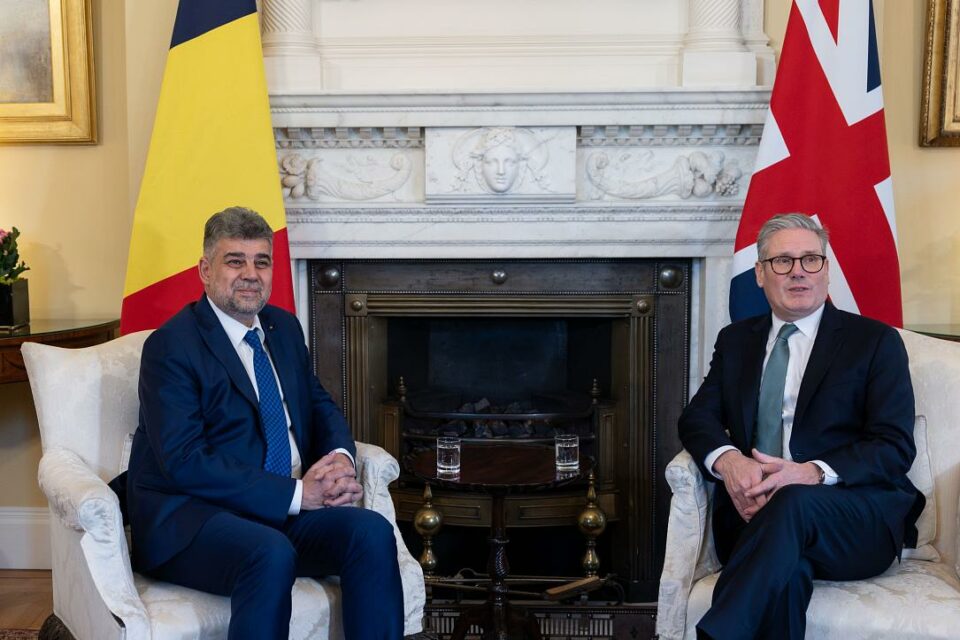“`html
Historic Meeting: Romanian PM Marcel Ciolacu Meets UK Leader Keir Starmer in London
Overview of the Meeting
The recent meeting between Romanian Prime Minister Marcel Ciolacu and UK Labour Leader Keir Starmer marks a significant moment in strengthening bilateral relations between Romania and the United Kingdom. Held in London, this diplomatic engagement sought to address critical issues including economic collaboration, environmental policies, and security challenges facing both nations.
Key Topics of Discussion
1. Economic Collaboration
One of the focal points of the discussion was enhancing the economic ties between Romania and the UK. Both leaders expressed a commitment to exploring new trade agreements and investment opportunities. Some key areas they pinpointed for collaboration include:
- Technology and Innovation: Encouraging partnerships in tech startups and research.
- Green Energy: Collaborating on renewable energy projects to combat climate change.
- Agriculture and Food Security: Expanding agricultural exports and sustainable farming techniques.
2. Security and Defence Cooperation
The leaders addressed shared security concerns, particularly in the context of evolving geopolitical dynamics. They underscored the need for closer cooperation in defence strategies to ensure regional stability:
- NATO Partnerships: Reinforcing commitments to NATO obligations.
- Cyber Security: Joint efforts to combat cyber threats and enhance digital sovereignty.
- Counter-Terrorism: Collaborative measures to ensure public safety against extremist threats.
3. Cultural Exchange and People-to-People Ties
Both PM Ciolacu and Leader Starmer highlighted the importance of cultural exchanges in enhancing mutual understanding and cooperation. They discussed initiatives aimed at:
- Student Exchange Programs: Fostering academic collaborations between Romanian and UK universities.
- Tourism Promotion: Boosting tourism to showcase the cultural richness of both nations.
- Arts and Culture Events: Supporting joint events to promote Romanian and British arts and heritage.
Benefits of Enhanced Bilateral Relations
Strengthening ties between Romania and the UK is poised to yield various benefits:
1. Economic Growth
Increased trade and investment could lead to significant economic growth in both countries. Initiatives from this meeting may boost business opportunities, job creation, and innovation.
2. Improved Security
Closer collaboration in security can lead to enhanced safety for citizens, improved intelligence sharing, and robust defensive frameworks to tackle shared threats.
3. Cultural Enrichment
Cultural programs can foster deeper societal ties and encourage a spirit of cooperation and understanding between the Romanian and British peoples.
First-hand Experiences: Romanian Diaspora in the UK
The Romanian community in the UK has long been a bridge between the two nations. Many Romanians living in the UK express optimism about the outcomes of the Ciolacu-Starmer meeting:
“We believe that strengthened ties will not only benefit businesses but also enhance our cultural identity and representation in the UK,” says Elena, a Romanian expatriate based in London.
Case Studies: Successful Bilateral Collaborations
1. Tech Initiatives
Several Romanian tech firms have successfully partnered with UK-based organizations to develop innovative solutions. One notable case is the collaboration between a Romanian AI startup and a UK financial institution, which has resulted in advanced fraud detection systems
Strengthening Ties: Romanian Prime Minister’s Landmark Visit to the UK
On Wednesday, November 13, British Prime Minister Keir Starmer welcomed Romania’s executive leader, Marcel Ciolacu, in London. This significant meeting was centered around expanding economic partnerships and enhancing defense collaboration between the two nations.
This visit marked a historic occasion as it was the first trip by a Romanian prime minister to the United Kingdom in over 17 years.
Pledges for Enhanced Cooperation Amid Global Challenges
Ciolacu and Starmer engaged in discussions about fostering deeper ties related to defense and public procurement. They underscored the necessity of bolstering support for allied nations facing ongoing threats from Russia. According to an official statement from Starmer’s office, “The relationship between our countries offers numerous opportunities across defense, security, trade, and investment,” they both asserted.
A significant highlight of their meeting was the signing of an updated defense cooperation pact handled by Romania’s Defense Minister Angel Tîlvăr alongside UK Defense Secretary John Healey.
The Strategic Importance of Black Sea Infrastructure
The two leaders also deliberated over Romania’s crucial national infrastructure within the context of Black Sea stability and discussed potential UK investments that could include advancements in clean energy technology.
Following their discussions on social media platform X (formerly Twitter), Ciolacu expressed optimism about forging a robust friendship with Starmer that would benefit both nations’ citizens while promoting democratic values globally. “Our strong Romanian diaspora in Britain motivates us to further solidify our strategic alliance at all levels,” he noted. “We have committed ourselves to strengthening economic relations alongside our defense partnership.”
Bilateral Dialogue at Key Events
During his time in London, Ciolacu also participated with Lord Mayor Alastair King at the inaugural Romanian-British Economic Forum. In his address there, he highlighted how enduring dialogue has reinforced historical bonds rooted deeply within Romanian-British relations over time.
“While we have solid historical connections,” remarked Ciolacu, “the most vital link today is undoubtedly represented by our sizable community here—over 1.2 million Romanians residing in the United Kingdom.” In contrast, he urged that Romania is working diligently to entice individuals back home for work opportunities.
A Win-Win Proposal for Investment Opportunities
“I hope we can persuade more leaders from major British firms that investing in Romania presents lucrative opportunities,” Ciolacu suggested during discussions with business elites. He emphasized this mutual benefit strategy: attracting investments into Romania would retain talent domestically while simultaneously stimulating local economic growth.” This sentiment was further backed by recent data indicating rising salaries among engineers nationwide ranging between €2,000-€3,a000—a clear signal of progress being made through infrastructure projects involving highways and healthcare facilities across regions.”
Praising Foreign Investors’ Contributions
Cilocu acknowledged contributions from British businesses operating within Romania’s borders—singling out firms like Rezolv Energy as exemplary models driving positive change.
“As of now,” he elaborated further regarding energy independence goals—“Romania stands as one of Europe’s most self-reliant countries concerning energy access—we import merely 28% compared against an EU average close to double.” As such turbines spin faster than imports soar above plentiful reserves amid continued growth chances abound despite turbulent climates; investors should feel assured: invest here—it pays off!” declared Ciolacu animatedly during public engagements following meetings prior!
(p)(Photo source: Gov.ro)


